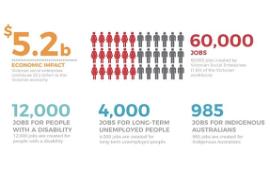Victorian social enterprises are important contributors to the state economy

In Summary
- Victoria’s social enterprises contribute more than $5.2 billion to the Victorian economy
- The majority of Victoria’s social enterprises are less than ten years old
- Opportunity to support early stage enterprises to ensure their ongoing success
A new report detailing the impact of the growing Social Enterprise sector has found that Victoria’s 3,500 social enterprises contribute more than $5.2 billion to the state economy and generate around 60,000 jobs.
Developed by the Centre for Social Impact (CSI) at Swinburne, the report, called the Map for Impact: Victorian Social Enterprise Mapping Project, is part of the Victorian Government’s Social Enterprise Strategy. It was released by the Minister for Industry and Employment, Ben Carroll on 1 December.
The report finds that Victoria’s social enterprises are thriving, vibrant and important contributors to the state economy. They also are actively contributing to an inclusive economy. Almost 19 per cent of the social enterprise workforce is people with a disability, which is more than double the rate of participation of people with a disability in small to medium enterprises.
“Congratulations to the Centre for Social Impact at Swinburne University of Technology for identifying and characterising Victoria’s huge network of diverse social enterprises," Mr Carroll says.
"Many social enterprises are giving disadvantaged people the opportunity to share in Victoria’s impressive growth through the dignity of a job. These opportunities are critical to our fair and inclusive economy."
Project lead and CSI Swinburne director, Professor Jo Barraket says that social enterprises are diverse and often complex, with variances in legal structure, size, industry sector, social mission, and sources of income.
“Social enterprises are notoriously challenging to identify and locate. With the Map for Impact project, our aims were twofold: first to identify and locate Victoria’s social enterprises, then understand their characteristics and impacts.
“We already know what a vital role they play in the social impact landscape, but revealing their economic and employment impacts has been really exciting,” Professor Barraket says.
The majority of Victoria’s social enterprises are less than ten years old, which indicates that it is a burgeoning way of doing business.
The report also highlights the opportunity to focus sector-building efforts on supporting early stage enterprises to ensure their ongoing success.
Principal author, Dr Erin Castellas, says there are myriad interventions that could be implemented.
“We know that social enterprises struggle with a lack of resources to support marketing, communication, and business development.
“Imagine a coordinated approach that includes policy support, government funding, early stage financing, capacity building, and so on.
“The research really shows the ways we can develop social enterprises and further enhance the inclusive economy that they foster,” Dr Castellas says.

